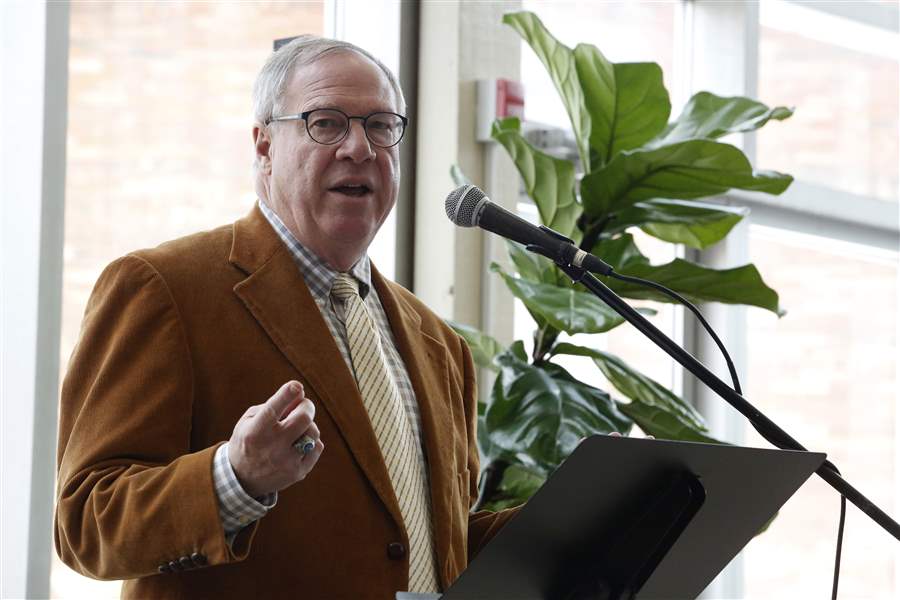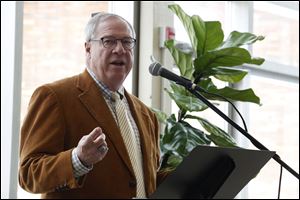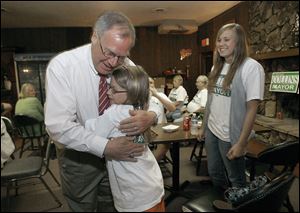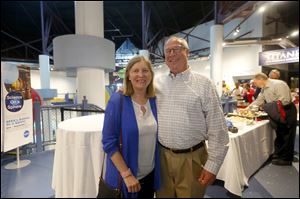
D. Michael Collins: 1944-2015: Toledo mayor ‘a true old-fashion Irish leader’
2/7/2015
Toledo Mayor D. Michael Collins speaks to residents and dignitaries during a meeting at the Genesis Village Retirement Community on November 17, 2014.
THE BLADE / Amy E. Voigt
Buy This Image

Toledo Mayor D. Michael Collins speaks to residents and dignitaries during a meeting at the Genesis Village Retirement Community on November 17, 2014.
Toledo Mayor D. Michael Collins, a former police detective who went into politics in retirement and was elected mayor in 2013, died Friday in University of Toledo Medical Center, five days after suffering cardiac arrest while driving a city-owned vehicle. He was 70.
Mr. Collins, Toledo’s fourth mayor under the “strong mayor” form of government that went into effect in 1993, had just entered his second year on the job.
During his first year, he faced an unprecedented snow and cold emergency, the deaths of two firefighters in an arson, and a nearly three-day period in which residents were advised not to drink the city’s water because of an algae-related toxin in Lake Erie.
He was the first Toledo mayor to die in office since 1904 when Samuel “Golden Rule” Jones died after a brief illness.
A political independent, Mr. Collins was elected in 2013, defeating incumbent Mayor Mike Bell, also a political independent. He was a come-from-behind candidate in the primary, defeating two Democrats who split the Democratic vote, former city councilman Joe McNamara and Lucas County Auditor Anita Lopez. Mr. Collins finished second in the primary with 24.4 percent of the vote, after Mayor Bell, with 26.6 percent, to go to the runoff November general election.
Mr. Collins said the other candidates tried to cast him as not a serious contender, but advancing to the general election did not surprise him.
“I believed in it all along. I honestly did,” Mr. Collins said at the time. “I believe I have the skill and the capacity to listen and to write the next chapter, which will be the first chapter of the book called New Toledo.”
Former Toledo Mayor Carty Finkbeiner recalled Friday that Mayor Collins worked tirelessly to improve the city and life for Toledoans as mayor, councilman, and police officer.
“We should celebrate Mike’s commitment to improving the quality of life for Toledoans and their families and policemen and their families,” he said. “He was a true old-fashion Irish leader. He would be urging us to continue on to do those things to make Toledo better.”
Mr. Finkbeiner said he had known Mr. Collins since his days as union president for the police union, and he threw his support behind the late mayor in the 2013 election because he believed he wanted to clean up blighted neighborhoods and emphasize law enforcement presence.
“He has always been much like myself. Intense, and at times combative, and a competitor. He had a warm Irish heart beneath the intense, combative exterior,” Mr. Finkbeiner said.
During the November general election, Mr. Collins attacked Mr. Bell’s claims to have faced a $48 million deficit, made a campaign promise to lower the city’s income tax rate — something he still had no specific plans for — and promised to restore police officers to the Northwest District Police Station on West Sylvania Avenue, which had been closed because of budget cuts, a promise he made good on.
The son of an Irish immigrant who had formed close ties to his relatives still living in Ireland, Mr. Collins proposed to adopt Ireland’s “Tidy Towns” program to spruce up the city.
Mr. Collins had the support of Democrats and labor unions determined to punish Mr. Bell for his support of a law aimed at weakening public employee unions and because Mr. Bell unilaterally reduced city employee pay and benefits to deal with a fiscal emergency in 2010.

In 1999, Mike Collins, president of the Toledo Police Patrolman’s Assoc-iation talked about his work.
Mr. Collins won the November election with 56.4 percent to Mr. Bell’s 43.5 percent.
But after he took office, the challenges of the job seemed to have little to do with what came up in the campaign.
Mayor Collins gained national attention for his handling of the August water crisis that occurred after chemical tests revealed microcystin in the city’s drinking water, brought on by an algae bloom in Lake Erie at the city’s water intake.
After about half a million city water customers were told to rely on bottled water for drinking and food preparation for three days, Mr. Collins hoisted a glass of clear water for the cameras to show that water quality had been restored.
Mr. Collins was invited by Chicago Mayor Rahm Emanuel to speak to other Great Lakes mayors about the threat to public water systems from algae blooms caused by phosphorus pollution in the lakes. Mr. Collins revealed that was his first trip to Chicago.
Recent challenges
Saving the Jeep Wrangler manufacturing line at Chrysler was Mr. Collins’ most recent challenge. He said in a conversation with a Blade reporter Sunday morning that he was unable to divulge details of his discussions about that with Sergio Marchionne, CEO of Fiat Chrysler Automobiles, because they had a confidentiality agreement.
His administration was involved in initiatives to sell the former Southwyck Shopping Center, which the city bought last year under Mayor Collins’ initiative. The mayor oversaw the demolitions of two eyesores — the former Clarion Hotel near Southwyck and two smokestacks left over from a power plant at the Marina District in East Toledo.
Mr. Collins also was shepherding the proposal from ProMedica Health Systems Inc. to relocate its headquarters and about 800 employees to a campus to be created out of the former Toledo Edison steam plant on the river, with the addition of a parking garage.
Mr. Collins first was elected to office in 2007 to represent South Toledo District 2 following a 10-way primary.
After taking office, Mr. Collins became one of the most outspoken members, often sparring with then-Mayor Carty Finkbeiner.
His intervention into budget details and other matters, including police labor negotiations, so irritated Mr. Finkbeiner that he said Mr. Collins “considers himself the world’s most outstanding expert on any and all subjects.”

In 2009, mayoral candidate D. Michael Collins hugged his granddaughter Sara Dickey 10, while another granddaughter Liz Dickey, 17, watched at a gathering of volunteers and supporters of his campaign at the Toledo Police Patrolman’s Association Union Hall.
Mr. Collins blew the whistle on a $150,000 effort by the Finkbeiner administration to make over the Erie Street Market into a concert hall after getting a call from a North Toledo bar owner who complained that lights had been removed from his bar and installed in the city-owned market.
“Out of curiosity, going into work the next morning I stopped at the Erie Street Market,” Mr. Collins said. “There had to have been 60 people working there.”
He ran unsuccessfully for mayor in 2009, coming in fourth out of six, against Democrats Ben Konop and Keith Wilkowski, former Fire Chief Bell, Republican Jim Moody, and independent Opal Covey. Mr. Bell won the general election against Mr. Wilkowski.
Mr. Collins was re-elected to his council seat in 2011, and kept up his dogged investigation of city government. He showed that the Bell administration had purchased a GMC Terrain for the mayor to drive under the budget description of “street sweeper.”
After he became mayor, Mr. Collins used the compact sport utility vehicle as his official city vehicle, impishly calling it his street sweeper. It was this official city vehicle that crashed into a pole after Mr. Collins suffered cardiac arrest.
Mayor’s roots
Collins’ family lore had it that he was a distant relative of the legendary Irish revolutionary politician Michael Collins. But after traveling to Ireland to meet his family, and after his wife, Sandra Drabik, tried to research his genealogy among the limited Irish records, he acknowledged it was far from certain. An investigation by The Blade found that it was, at best, a long shot.
He was born June 30, 1944, the son of Michael John Collins, one of four siblings who immigrated to Toledo from Ireland, and the former Gertrude Helmer, of German ancestry, who died in 2006 at the age of 93.
He grew up in the central city on Fernwood Avenue, attending Roosevelt School for kindergarten and St. Teresa’s School until he was in fourth grade, and then moved to Orchard Street in the Old South End, where he enrolled in St. James School.
“It was a tough neighborhood,” he said of the south-end community. “You had to fight your way. It was a working-class, blue-collar neighborhood.”
He said his father made three demands of his children: Be devout Catholics, obtain a college education, “and never disgrace this family.”
At the Fernwood address, his mother collected rent from the building’s tenants, while his father worked for the S.M. Jones Co. plant on Segur Avenue, established by former Mayor Jones. Mr. Collins recalls the most “horrific experience” from his childhood being a break-in at their apartment when several people stole all the rent his mother had collected for the landlord.

On July 4, Mayor D. Michael Collins and his wife Sandra Drabik attended The Blade’s VIP party for Red, White, Kaboom at the Imagination Station in downtown Toledo.
During the 2013 campaign, Mr. Collins faced suspicion of racism from black voters because of his assertion that Toledo Police did not engage in racial profiling.
He defended himself, saying he had opposed racial prejudice even as a child. As evidence he told of the time a black family moved into his white South Toledo neighborhood. While other neighbors screamed epithets and threw things at the black owner’s house, the fifth grader Collins made a sign saying “Welcome to the neighborhood” and got beaten up by the white mob.
He said his father later told him, “‘Son, right now I’m the proudest father in the world — but don’t ever go back to that house without me.”
When Mr. Collins was 17 in 1962, his father, who took care of racehorses at the Lucas County Fairgrounds, was kicked by a horse and killed.
Path to service
After finishing high school, he enlisted in the Marines for two years of active duty and six years in the reserves.
He joined the Toledo Police Department in 1973 in the uniformed division, and went on to work in the vice squad, metro drug unit, and crimes against persons. He graduated from the University of Toledo, and in 1999 obtained a master’s in business administration degree from UT.
In 1988, he was elected president of the Toledo Police Patrolman’s Association and continued until he retired in 1999. Mr. Collins said he negotiated the best police salary and benefit package in the state.
Ron Scanlon, a fellow retired Toledo police officer, worked with Mr. Collins in the drug and detective units in the 1970s and early 1980s.
“He was one of the best investigators we had,” he said.
Lucas County Sheriff John Tharp, a retired police officer who also worked with the late mayor in the detective unit, said he had an impeccable reputation with informants and witnesses, and that relationship helped him cultivate information.
“He was a man of his word. If he said he would do something he would do it. You could take it to the bank,” Sheriff Tharp said.
Diocese of Toledo Bishop Daniel Thomas mourned the loss of the mayor, whose faith was a prominent part of his life.
“Mayor Collins often spoke of the importance of his Catholic faith and the many ways the Lord had blessed his life. I will count among my blessings the opportunity to have come to know him, to have met his family, and to have prayed with his wife at his hospital bedside,” Bishop Thomas said in a written statement released Friday. “I invite Catholics and all people of goodwill to pray for the happy repose of his soul, and to pray for and with his wife and family as they mourn his loss.”
Mayor Collins’ sister, Mary Pat Hobbs, said she, his wife, and his daughters on Friday were sharing memories of the late mayor.
In 2005, Mr. Collins married Ms. Drabik, former vice president and general counsel for the University of Toledo. The couple lived on Island Avenue in South Toledo.
“Sandy is a solid woman. It is not easy no matter how strong you are. But she is doing the best,” Ms. Hobbs said. “He is a wonderful man. He is going to be very missed.”
From his first marriage, which ended in divorce, he is survived by three daughters, Tammy Dickey, Laurie Mulligan, and Kelly Sheridan. A son, Michael, preceded him in death.
Funeral arrangements are pending through Coyle Funeral Home.
Staff writer Mark Reiter contributed to this report.
Contact Tom Troy: tomtroy@theblade.com or 419-724-6058 or on Twitter @TomFTroy.